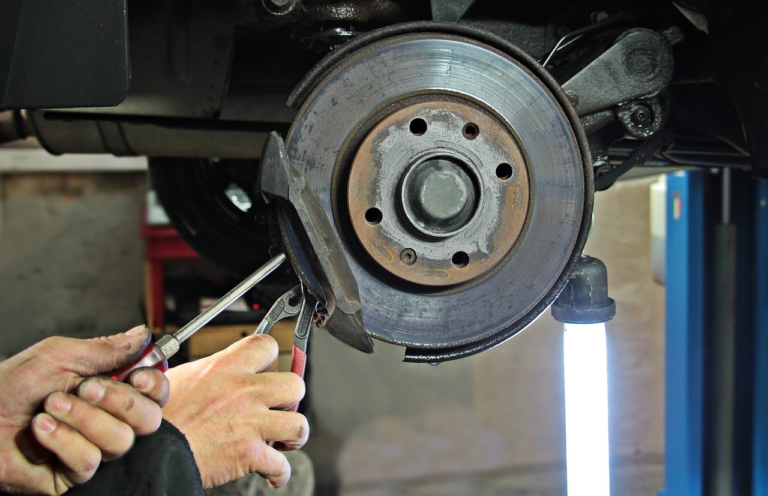Blog
How Spongy Brakes Can Absorb Your Stopping Power
does it feel like you’re having to press harder on the brake pedal than before, or that it’s just not responding like it should? few things are more unnerving than soft or spongy brakes — it can feel like your car won’t stop. this is a serious safety concern; here’s how to address it.

how your brakes work
brakes — you take them for granted, but they’re actually quite complex. there are two basic types of braking systems: disc and drum. most vehicles have disc brakes on the front axle and drum in the rear, but some have discs all the way around.
disc brake system components:
- pads
- rotors
- calipers
drum brake system components:
- shoes
- drums
- wheel cylinders
both types of systems have a master cylinder, where hydraulic pressure is created when you press the brake pedal. the pedal moves two pistons inside the master cylinder, which pressurizes the brake fluid. the pressurized brake fluid is then forced through a series of brake lines to the wheels.
at each wheel, the brake fluid forces a hydraulically operated caliper to push the brake pads against the rotor. in a drum brake system, hydraulic pressure causes the wheel cylinder to push the brakes shoes against the drum. either scenario is designed to slow down the vehicle and eventually bring it to a stop. but things can go wrong that make the brakes less responsive — in other words, spongy or soft.
reasons why your brakes are spongy
soft brakes are typically caused by one or more of the following:
- air in the system
- faulty brake lines
- brake fluid condition
- faulty brake drums
- worn brake pads
get it diagnosed by a professional
air in the system
brake application is accomplished through hydraulic pressure. unlike hydraulic brake fluid, air is compressible. as a result, air in the brake fluid will be compressed during brake pedal application, resulting in a spongy pedal. there are a few different ways air can enter the system.
prior improper repair: every time the brake hydraulics are opened for service, air enters the system. if the brakes are not bled properly after the repair is done, the pedal will feel spongy. it may even go to the floor.
solution: your brakes should be bled. have a certified mechanic do it, or, if you’re comfortable with it, follow the manufacturer’s recommended procedure.
brake fluid leaks: brake fluid leaks mean the hydraulic system has been opened up, allowing air to enter. this results in a spongy brake pedal.
solution: brake fluid leaks need to be diagnosed and repaired right away, as they can drastically affect braking performance. note that the leak may not always be visible. it could be an internal leak, inside the master cylinder, wheel cylinder, or somewhere else. once the leak has been addressed, the brakes should be bled.
low fluid level: a low brake fluid level can result from a leak or worn brake pads or shoes. if the level is low enough, air will get sucked into the system through the master cylinder during brake application.
solution: have the cause diagnosed and repaired by a professional. low brake fluid is a serious safety concern, so this should be done as soon as possible. once it’s been addressed, the brakes should be bled.
faulty brake lines
portions of the brake lines are made of rubber hose. deteriorated hoses may bulge out when the brake pedal is depressed, causing a spongy brake pedal.
solution: have the faulty brake hose replaced, and then bleed the brakes.
bad brake fluid
over time, brake fluid absorbs moisture. water in the system can heat up and turn to gas under heavy braking. since gas is compressible and brake fluid is not, the pedal will feel spongy every time it’s depressed. it’s also possible that someone accidentally contaminated the system by adding something other than brake fluid to it, such as engine oil or transmission fluid.
solution: flush the brake system and replace any components that may have been damaged as a result of contamination.
damaged brake drums
if the brake drums are too thin or cracked, they will expand every time they make contact with the shoes. consequently, every time the brakes are applied, the pedal will have a spongy feel.
solution: replace the brake drums. if the brake shoes have been damaged because of the faulty drums, they should also be replaced.
worn brake pads
excessive taper, or a concave wear pattern, can prevent the brakes pad from making full contact with the caliper piston or brake rotor. this allows the pad to flex, causing a spongy feel when the brakes are applied.
solution: the brake pads should be replaced. in addition, the mechanic should visually inspect and measure the rotors to see if they need to be machined or replaced.
get your brakes checked
even if you don’t feel a braking problem (or hear one), your brakes should be inspected at least once a year. how often you need to get them replaced will vary depending on your car and your brake usage.
remember, brakes are the most important safety feature on your car, and if something seems wrong with them, get your car inspected by a professional technician immediately.

